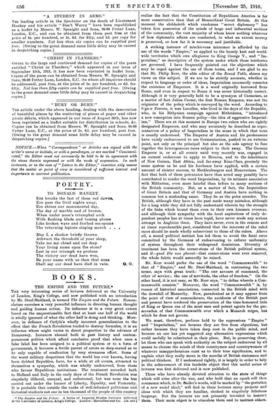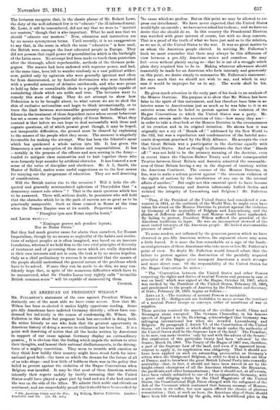BOOKS.
1.11e, EMPIRE AND THE FUTURE.*
Tax very interesting series of lectures delivered at the University of London, King's College, and now published with an introduction by Mr. Steel-Maitland, is termed The Empire and the Future. Nomen- clature exercises a very powerful influence in directing human thought and guiding human action. Its influence is to a very great extent based on the unquestionable fact that at least one half of the world is wholly ignorant of what the other half is doing and thinking More- over, in defiance of Carlyle's wholly incorrect generalization to the effect that the French Revolution tended to destroy formulae, it is an influence whose might varies in direct proportion to the advance of Democracy. Instances abound both in past history and contem- poraneous politics -which afford conclusive proof that when once a false label has been assigned to a political system or to a form of government, it becomes a fertile parent of errors so deep-seated as to be only oapablo of eradication by very strenuous effort. Some of the worst military despotisms that the world has ever known, having been dubbed Republics, have, for a while at all events, attracted to themselves a sympathy, which was wholly undeserved, from those who favour Republican institutions. The treatment accorded. both to Holland and Italy in the early days of the French Revolution was singularly illiberal, unequal, and unfraternal, but was none the less carried out under the banner of Liberty, Equality, and Fraternity. It is probable that outside the ranks of well-informed politicians and historical students not one in ten thousand of the people of this country -A The Respire and the Future. A Series of Imperial Studies Lectures delivered in the University of London. flieg's College. London binernilliin and Co. PA. gal realize the fact that the Constitution of Republican America is far more conservative than that of Monarchical Great Britain. At this moment the shibboleth which condemns " secret diplomacy " has taken firm possession of the minds of large and influential sections of the community, the vast majority of whom know nothing whatever of how diplomatio affairs are conducted, to what an extent secrecy is preserved, or how far it is necessary and justifiable.
A striking instance of mischievous misnomer is afforded by the use of the words " Empire," as applied to the loosely knit and world- wide territories which owe allegiance to King George V., and " Im- perialism," as descriptive of the system under which those territories are governed. I have frequently pointed out the objections which may be urged against the use of those terms, and I am glad to see that Mr. Philip Kerr, the able editor of the Round Table, shares my views on this subject. If we are to be strictly accurate, whether in respect to language or order of ideas, Imperialism necessarily connotes the existence of Emperors. It is a word originally borrowed from Rome, and even in respect to Rome it was never historically correct. Although it is very generally held to be a synonym of Caesarism, as a matter of fact Julius Caesar, the first Roman Emperor, was not the originator of the policy which is conveyed by the word. According to S'g-n3r Ferrero, it was Lucullus, who lived in the days of the Republic, who, in his Bithynian campaign against Mithridatea, " introduced a new conception into Roman policy—the idea of aggressive Imperial- ism." There are at this moment in Europe two rulers who are rightly designated Emperors, and who may accurately be described as repre- sentatives of a policy of Imperialism in the sense in which that term is usually understood. The Emperor of Austria and his predecessors have vainly endeavoured to use Germanization, pushed to an extreme point, not only as the principal but also as the sole agency to fuse together the heterogeneous races subject to their sway, The German Emperor is, or at all events until very recently was, engaged in an earnest endeavour to apply to Hereros, and to the inhabitants of New Guinea, East Africa, and far-away Kiao-Chau, precisely the same system as he and his forebears have applied, with a certain amount of sinister success, to Mecklenburgers and Hanoverians. The fact that both of these potentates have thus acted may possibly have contributed to render the word Imperialism, by its intimate association with Militarism, even more hateful than before to many sections of the British community. But, as a matter of fact, the Imperialism of Great Britain and that of Germany and Austria have nothing in common but a misleading name. They lie as the poles asunder. The British, although they have in the past made many mistakes, although for a long while they did not fully understand wherein lay the strength of the links which bound them even to their own kinsmen overseas, and although their sympathy with the local aspirations of truly de- pendent peoples has at times been tepid, have never made any serious attempt to Anglicize them. They have never, even in the remote and at times reprehensible past, considered that the interests of the ruled races should be made wholly subservient to those of the rulers. Above all, a sound political instinct has led them to avoid the fatal error committed by the Germans of endeavouring to enforce uniformity of system throughout their widespread dominions. Diversity of treatment has been the corner-stone of the British political system, and if—guod Die non placeat—that corner-stone were ever removed, the whole fabric would assuredly be ruined.
Mr. Kerr would prefer the use of the word " Commonwealth " to that of " Empire," and Mr. Steel-Maitland, in contrasting the two terms, says with great truth: "The one savours of command, the other of service ; the one of servitude, the other of freedom." On the other hand, it is not easy, as Mr. Kerr says, " to define wherein a Com- monwealth consists." Moreover, the word " Commonwealth " is, by reason of historical associations, connected in the British mind with the downfall of Monarchy. Now, paradoxical as it may appear from the point of view of nomenclature, the accidents of the British past and present have rendered the preservation of the time-honoured title of King or Queen one of the most sure and potent agents for the pre- servation of that Commonwealth over which a Monarch reigns, but which he does not govern.
We must, therefore, perforce hold to the expressions " Empire " and " Imperialism," not because they are free from objections, but rather because they have taken deep root in the public mind, and because no one has yet suggested any alternative expressions which could usefully be substituted in their place. But, in preserving them, let those who can speak with authority on the subject endeavour by all means to cleanse the minds of their countrymen and countrywomen of whatever misappreheneions exist as to their true significance, and to explain what they really mean in the mouths of British statesmen and political thinkers. If I understand rightly, it is largely in order to help in the achievement of this laudable object that this useful series of lectures was first delivered and is now published.
Those who have already devoted attention to the state of things which will arise after the war, and who hold that an epoch will then commence which, in Dr. Sadler's words, will be marked by " the gestation of a new social ideal," will find in these lectures many projects and ideas with which they are familiar, clothed in singularly felicitous language. But the lectures are not primarily intended to instruct them. Their main object is to stimulate them and to instruct °then.
The lecturers recognize that, in the classic phrase of Mr. Robert Lowe, the duty of the well-informed few is to " educate" the ill-informed many. Mr. Lowe, it will be remembered, did not say that we were to " instruct our masters," though that is also important. What ho said was that we should " educate our masters." Now, education and instruction are by no means synonymous terms. Until recently, it is no exaggeration to say that, in the sense in which the term " education " is here used, the British were amongst the least educated people in Europe. They did not possess that rapid power of generalization which is the birthright of the Latin races. No attempt had been made to teach them patriotism after the thorough, albeit reprehensible, methods of the German peda- gogues. The masses had been endowed with supreme power, and had, at the same time, been left to wander aimlessly in a vast political wilder- ness, guided only by agitators who were generally ignorant and often far from disinterested, or by fanciful doctrinaires who were furnished with a powerful armoury of delusive catchwords, and who were prone to hold up false or unrealizable ideals to a people singularly capable of assimilating ideals which are noble and true. The lecturers want to remedy this state of things. They do not attempt to show how Federation is to be brought about, to what extent we are to shod the skin of exclusive nationalism and begin to think internationally, or to trace the limit between statesmanlike generosity and foolhardy con- fidence in the treatment of those dependent races whose recent behaviour has set a crown on the Imperialist policy of Great Britain. What they contend is that before we can hope to deal successfully with these and cognate questions, all of which present great though, it may be hoped, not insuperable difficulties, the ground must be cleared by explaining to the masses of the people what they mean. The moment is singularly favourable for making the attempt. War has been the Ithuriel's spear which has quickened a whole nation into life. It has given the Democracy a new conception of its duties and responsibilities. It has —notably in the persons of the officers and men serving in the Army— tended to mitigate class animosities and to knit together those who were formerly kept asunder by artificial obstacles. It has fostered a new sense of the value of discipline and obedience. Mr. A. L. Smith, the Master of Balliol, makes some useful suggestions as to the best means for carrying out the programme of education. They are well deserving of consideration.
Will the British nation rise to the occasion ? Will it belie the oft- quoted and generally mistranslated aphorism of Thucydides that " a democracy cannot rule others " ? That is the main question which has to be answered. There will, without doubt, be pessimists who will hold that the obstacles which lie in the path of success are so great as to be practically insuperable. Such as these existed in Rome at the time when the Roman Empire was at its zenith. Propertius said :—
" Frangitur ipsa suis Roma superba bonis," and Lucam wrote :- " Nimioque graves sub ponder° lapsus ; Nee so Roma ferens."
But they had much greater cause for alarm than ourselves, for Roman Imperialism, though by no means so neglectful of the habits and institu- tions of subject peoples as is often imagined, was based on an insecure foundation, whereas if we hold firm to the two vital principles of diversity of treatment and of governing those races which are really dependent in their own interests and not in ours, the task is by no means hopeless. Only as a chief preliminary to success it is essential that the masses of the people should understand the general nature of the problems which have to be solved. If once they can be made to do this, we may con- fidently hope that, in spite of the numerous difficultice which have to be encountered, what Sir Charles Lucas very rightly calls " invincible British commonsense " will bo capable of surmounting them.
CROMER.



































 Previous page
Previous page